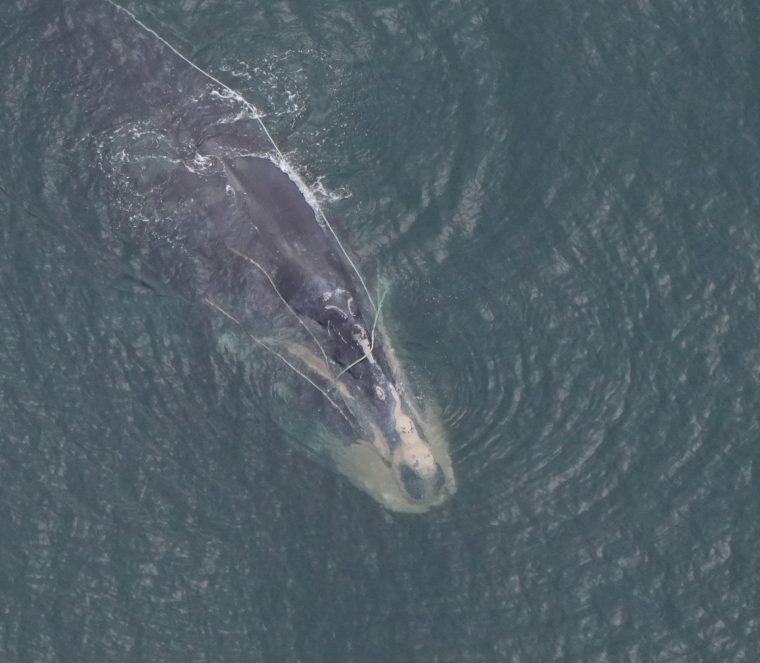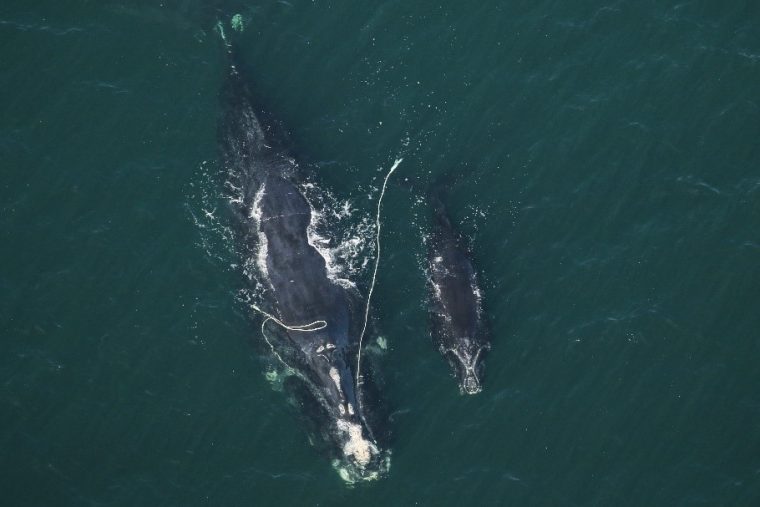New England Aquarium scientists believe death “all but certain” for whale, spotted south of Massachusetts during aerial survey

BOSTON, MASS. (Sept. 22, 2022) – The New England Aquarium sighted North Atlantic right whale “Snow Cone” south of Massachusetts yesterday entangled in new fishing gear, while still carrying gear from a previous incident, and in extremely poor health. The case magnifies the urgent need for dramatic changes to fixed gear fisheries, including accelerating the transition to ropeless or “on-demand” gear.
**PHOTOS OF SNOW CONE AVAILABLE FOR DOWNLOAD HERE**
Scientists with the New England Aquarium’s aerial survey team were flying 15 miles south of Nantucket on Sept. 21 when they saw Snow Cone (Catalog #3560) actively entangled. Research Assistants Sharon Hsu and Katherine McKenna documented the whale, taking photos of where the gear was on the whale’s body and detailed notes to share for potential disentanglement efforts. The team reviewed the photos in the plane to check if it was a known entanglement. Hsu, who also photographed Snow Cone at her previous entanglement sighting in March 2021, was shocked by the decline in the whale’s health.
“Eighteen months ago, there was hope that disentanglement efforts could remove enough of the gear and that would allow her to survive. Now, she’s covered in orange cyamids [whale lice]. She was moving so slowly, she couldn’t dive, she just sunk. She’s suffering. There is no longer hope for her survival,” Hsu said.
The scientists immediately alerted the Center for Coastal Studies’ disentanglement team, but due to the time of day and distance to her sighting, a response could not be mounted immediately. Currently, response efforts are on hold until weather conditions improve.
Snow Cone, featured in the documentary film The Last of the Right Whales, now carries rope from two different entanglements at the same time. Her health has deteriorated dramatically since she was seen in the Gulf of St. Lawrence, Canada, in July 2022. The decline in body condition is pronounced and indicative of the insurmountable energetic drain caused by the entangling rope. Heavy presence of orange cyamids, which are an indicator of poor health and suggest the whale’s swim speeds are reduced, and the appearance of rake marks on her head further illustrate the impact these injuries are causing. Her death is all but certain.
“We are watching one of the few remaining reproductive North Atlantic right whale females slowly die, and the deterioration and suffering that she has experienced is inexcusable,” said Heather Pettis, Research Scientist in the Aquarium’s Anderson Cabot Center for Ocean Life. “While horrific in and of itself, Snow Cone is not alone in her experience. More than 86% of right whales have experienced at least one and some individuals as many as eight entanglements, and the severity of these events has increased over time. The survival of this species demands that swift and broad actions be taken to prevent these events throughout their range.”
This is at least Snow Cone’s fifth entanglement. Her death after at least 18 months of suffering will also mean the likely loss of her lineage: Her first calf was killed by a boat and her second calf, born while Snow Cone was entangled, has not been seen since April.
“Bearing witness to the pain and suffering of this whale is gut wrenching,” said Senior Scientist Philip Hamilton. “Even worse is the realization that, with her imminent death, we will have lost the potential of as many as 30 future right whales being added to the species. We know several right whale family lines that have produced 25 to 30 progeny so far (calves, grand calves, great grand calves). The impacts of the loss of a single reproductive female gets amplified through time.”
Snow Cone, who in March 2021 was sighted with her fourth entanglement in fishing gear, drew international attention in December 2021 when researchers in the right whale calving grounds off the southeastern U.S. sighted her with a newborn calf. Snow Cone was still entangled, with rope deeply embedded in her upper jaw. Given the severity of her entanglement, which likely impacted her ability to eat and migrate efficiently, scientists expressed concern about whether she could effectively nurse a calf through weaning, due to the amount of energy it requires and her compromised state as a result of the entanglement.

Snow Cone’s entanglement also marks the fifth whale observed with attached gear in 2022. The situation underscores the urgent need for changes to the fishing industry—a shift to ropeless or “on demand” gear—as the critically endangered species, with an estimated population of fewer than 350 individuals, faces extinction.
“Researchers at the New England Aquarium are committed to continuing to utilize our science and expertise in whale movement, behavior, and human impacts to inform effective and lasting management and conservation actions,” Pettis said.
The New England Aquarium has one of the longest-running right whale research programs in the world, extensively studying the animals for more than 40 years. Scientists focus on solutions-based work, collaborating with fishermen on new techniques to reduce deadly entanglements in fishing gear, conducting spatial analyses to assess risk from vessels, facilitating communication across the maritime industry to reduce vessel strikes, and working with lawmakers locally, nationally, and internationally to develop science-based protections for the whales.
Learn more about right whales here.
MEDIA CONTACT:
Pam Bechtold Snyder – psnyder@neaq.org, 617-686-5068
